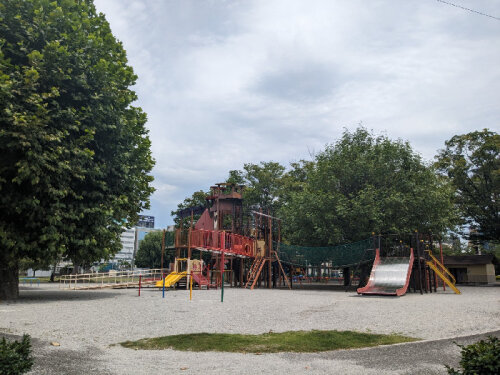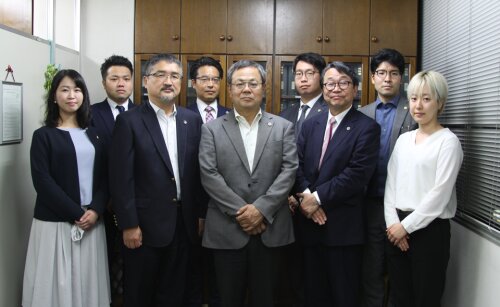Best Work Injury Lawyers in Shizuoka
Share your needs with us, get contacted by law firms.
Free. Takes 2 min.
List of the best lawyers in Shizuoka, Japan
About Work Injury Law in Shizuoka, Japan
Work injury law in Shizuoka is governed primarily by national Japanese laws that apply across all prefectures, combined with local administration and services based in Shizuoka Prefecture. The core statutory framework includes the Workers' Accident Compensation Insurance system and labour standards rules that require employers to manage workplace safety and to report and respond to work-related injuries and illnesses. In practice this means that most employees who suffer an injury or disease arising out of and in the course of employment may be eligible for medical care, wage-loss benefits, disability benefits, or survivor benefits through the workers' compensation scheme.
Local offices such as the Shizuoka Labour Bureau and the Labour Standards Inspection Offices in Shizuoka and Hamamatsu handle administrative procedures, accident recognition, and initial dispute handling. Affected workers often interact with employers, doctors, insurers, and these administrative bodies when seeking recognition and payment of benefits. Where coverage is denied or where the injuries involve serious negligence, permanent disability, or complex mental health issues, people frequently seek legal help to protect their rights.
Why You May Need a Lawyer
A lawyer experienced in work injury matters can help in many common situations, including:
- Your employer or the insurer denies that the injury is work-related or refuses to submit the claim to the Labour Standards Inspection Office.
- The workers' compensation insurer accepts liability for medical costs but refuses to pay appropriate wage-loss benefits, disability benefits, or survivor benefits.
- You have a serious or permanent injury and need help valuing long-term disability or future care needs.
- Your case involves occupational disease, repetitive strain injury, or mental health issues where proving work-related causation is legally and medically complex.
- You face employer pressure, unfair treatment, dismissal, or other retaliation after reporting an injury.
- You are an independent contractor or non-employee and the coverage question is disputed, or you want to pursue a civil claim for negligence in addition to administrative claims.
- You are a foreign worker with language barriers, immigration concerns, or cross-border issues and need legal representation that understands both the law and practical procedural steps.
- You want assistance preparing for mediation or a civil lawsuit to seek compensation beyond workers' compensation benefits, such as damages for pain and suffering or loss of consortium.
Local Laws Overview
Key legal elements to understand in Shizuoka are largely set by national statutes but administered locally:
- Workers' Accident Compensation Insurance. This national insurance system covers most employees for medical expenses, medical treatment allowance, temporary incapacity benefits, permanent disability benefits, survivor benefits, and funeral expenses for accepted work-related injuries and diseases.
- Coverage scope. Generally employees are covered whether full-time, part-time, or fixed-term. Some categories of people, such as independent contractors or certain family workers, may not be automatically covered and may need to rely on contractual or civil claims.
- Work-relatedness. For a claim to succeed the injury or disease must be recognized as arising out of and in the course of employment. This includes accidents at the workplace, injuries during work tasks away from work, commuting accidents in many cases, and occupational diseases caused by workplace exposures. Mental health conditions may be compensable where a causal link to work-related stressors can be established with medical and factual evidence.
- Employer duties. Employers must take reasonable measures to prevent accidents, comply with health and safety regulations, keep accident records, and report serious incidents to the Labour Standards Inspection Office. Employers are expected to submit workers' compensation claims promptly once notified of an injury.
- Administrative procedure. Claims are typically filed with the employer and processed under the workers' compensation system, with the Labour Standards Inspection Office reviewing and recognizing work-related cases. If the administrative decision is unfavorable, there are internal appeals and administrative review processes, and ultimately civil litigation options.
- Dispute resolution. Disputes over recognition, benefit levels, or causation can be handled by administrative review, mediation through labour offices, or by filing a civil action in the ordinary courts. The civil route may allow claims for additional damages if employer negligence caused the injury.
- Time limits. Prompt action is important. For workers' compensation you should file and seek recognition as early as possible. For civil claims, the general statute of limitations for torts is three years from the date you knew the injury and the responsible party, with an absolute limitation in most cases at 20 years from the event.
Frequently Asked Questions
What should I do immediately after a workplace injury?
Seek medical attention first. Notify your employer as soon as possible and keep records of the notification. Ask your employer to submit a workers' compensation claim to the Labour Standards Inspection Office and keep copies of medical certificates, treatment records, and any incident reports.
Am I covered by workers' compensation if I am part-time or a temporary worker?
Most workers are covered regardless of full-time or part-time status. Coverage depends on the employment relationship rather than the number of hours. If you are unsure about your employment status or coverage, consult the Labour Standards Inspection Office or a lawyer.
Can commuting accidents be covered?
Yes, commuting accidents are often covered under the workers' compensation scheme if the accident occurred on a regular route between your residence and workplace or a designated work site. Details can depend on the circumstances, so document the route and the circumstances of the accident carefully.
How do I prove that a mental health condition is work-related?
Recognition of work-related mental injury requires medical diagnosis, documentation of workplace factors such as heavy workload, harassment, or traumatic events, and a causal connection between work conditions and the condition. Keep records of incidents, communications, medical reports, and any support from supervisors or colleagues. A lawyer can help collect and present the necessary evidence.
My employer says I am an independent contractor. Does that mean I am not covered?
Not necessarily. The legal question is whether the relationship is actually employment under Japanese law. Courts and administrative authorities look at the substance of the relationship - control, integration, payment method, and other factors - not just the label the employer uses. If coverage is denied, consult a lawyer to review the facts and argue employment status if appropriate.
What types of benefits can I receive under the workers' compensation system?
Accepted claims can yield coverage for medical expenses, temporary disability benefits for lost wages during treatment, permanent disability benefits if impairment remains, survivor benefits for dependents in fatal cases, and funeral expenses. The exact calculation and eligibility depend on your wage level, degree of disability, and other statutory formulas.
Can I sue my employer in court in addition to applying for workers' compensation?
Yes. Workers' compensation gives administrative remedies and benefits, but you may also have a civil claim for negligence seeking additional damages for pain and suffering, future care costs, or loss not covered by workers' compensation. Civil suits can be complex and may involve proving employer negligence beyond what is needed for administrative recognition.
What if my employer retaliates against me for filing a claim?
Retaliation for filing a workers' compensation claim is prohibited. If you experience unfair treatment, demotion, dismissal, or harassment after a claim, document incidents and contact the Labour Standards Inspection Office, the local employment standards authorities, or a lawyer. You may have claims for unfair dismissal or other remedies.
How long does the workers' compensation process take?
Timing varies with the complexity of the injury, the clarity of medical evidence, and whether the insurer or employer contests the claim. Simple claims may be approved quickly, while disputes over causation or severe permanent disabilities can take months or longer. Seeking legal help early can speed evidence gathering and improve your chances for timely resolution.
I am a foreign worker. Are there special considerations I should know?
Foreign workers have the same rights to workers' compensation as Japanese workers if they are employees. Language barriers, immigration status, and unfamiliarity with administrative procedures can complicate matters. Seek assistance from a bilingual lawyer, a municipal support service, or legal aid organizations to ensure your rights are protected and the correct procedures are followed.
Additional Resources
Useful organizations and bodies to contact in Shizuoka include:
- Shizuoka Labour Bureau and the Labour Standards Inspection Office - for administrative claims, reporting, and inquiries about workplace safety and workers' compensation.
- Ministry of Health, Labour and Welfare - the national authority that sets policy and law on workers' compensation.
- Japan Legal Support Center - government-funded legal aid service that can provide guidance and financial support options for legal representation.
- Local bar association - for referrals to lawyers who specialize in labour and personal injury law in Shizuoka.
- Labour unions and workplace safety committees - for support, documentation, and collective assistance in workplace safety matters.
- Municipal social welfare and health services - for practical support with medical follow-up, rehabilitation, and social services.
Next Steps
If you have suffered a work injury or illness in Shizuoka, follow these steps to protect your rights and health:
- Seek medical treatment immediately and obtain written medical records and certificates.
- Notify your employer in writing about the injury and keep a copy of the notification.
- Request that your employer submit a workers' compensation claim to the Labour Standards Inspection Office and ask for a copy of any forms they file.
- Keep thorough records - medical bills, receipts, wage statements, witness names, photos of the scene, and any communications with your employer or insurer.
- Contact the Shizuoka Labour Bureau or the local Labour Standards Inspection Office to confirm the status of your claim and to learn the administrative process specific to your case.
- If your claim is denied, benefits are insufficient, or the matter is complex, consult a lawyer who handles work injury cases to review evidence, advise on civil claims, and represent you in administrative appeals or court if needed.
- If you need financial support to secure a lawyer, inquire with the Japan Legal Support Center about legal aid options and eligibility.
This guide is informational and does not replace personalized legal advice. For decisions that could affect your benefits, employment, or legal rights, consult a qualified lawyer experienced in work injury and labour law in Shizuoka.
Lawzana helps you find the best lawyers and law firms in Shizuoka through a curated and pre-screened list of qualified legal professionals. Our platform offers rankings and detailed profiles of attorneys and law firms, allowing you to compare based on practice areas, including Work Injury, experience, and client feedback.
Each profile includes a description of the firm's areas of practice, client reviews, team members and partners, year of establishment, spoken languages, office locations, contact information, social media presence, and any published articles or resources. Most firms on our platform speak English and are experienced in both local and international legal matters.
Get a quote from top-rated law firms in Shizuoka, Japan — quickly, securely, and without unnecessary hassle.
Disclaimer:
The information provided on this page is for general informational purposes only and does not constitute legal advice. While we strive to ensure the accuracy and relevance of the content, legal information may change over time, and interpretations of the law can vary. You should always consult with a qualified legal professional for advice specific to your situation.
We disclaim all liability for actions taken or not taken based on the content of this page. If you believe any information is incorrect or outdated, please contact us, and we will review and update it where appropriate.











